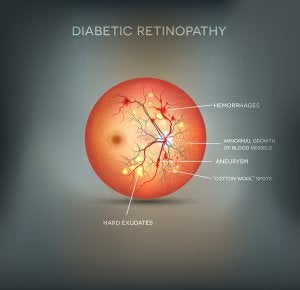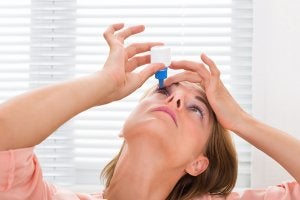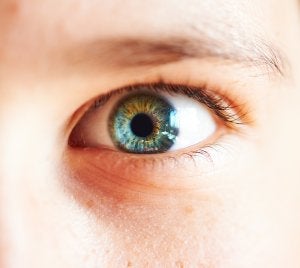-
Protect Your Eyes with Healthy Habits
To protect your healthy eyes, schedule an exam every year with an eye doctor. Your ophthalmologist can detect vision problems early on and provide appropriate treatments. An ophthalmologist near Chicago can also recommend healthy eye care habits to preserve your vision , some of which are outlined in this video.
This video features actress and cookbook author Deirdre Hall, who explains that age-related macular degeneration (AMD) runs in her family. She gets her eyes checked by an optician each year and eats a healthy diet filled with plenty of vibrantly colored fruits and vegetables. This video also explains why lifestyle choices that can improve your cardiovascular health are also healthy for your eyes.
-
Diagnosing and Treating Diabetic Retinopathy
 Diabetes is a serious disease that can lead to complications that affect many different parts of the body, including the eyes. This is one reason why it’s essential for patients with diabetes to schedule regular exams with an eye doctor. An ophthalmologist near Chicago can detect diabetic retinopathy when it is still in its early stages. Diabetic retinopathy is a condition that involves damage to the blood vessels of the eyes. Over time, patients may suffer from permanent vision loss.
Diabetes is a serious disease that can lead to complications that affect many different parts of the body, including the eyes. This is one reason why it’s essential for patients with diabetes to schedule regular exams with an eye doctor. An ophthalmologist near Chicago can detect diabetic retinopathy when it is still in its early stages. Diabetic retinopathy is a condition that involves damage to the blood vessels of the eyes. Over time, patients may suffer from permanent vision loss.Identifying the Symptoms
When diagnosing diabetic retinopathy, the ophthalmologist will ask the patient about his or her symptoms. Although this condition does not usually cause symptoms in its early stages, patients may eventually notice blurry vision, spots or floaters in the visual field, dark areas in the visual field, or vision loss. Over time, patients develop an increasing reliance on vision correction, such as eye glasses.
Conducting Diagnostic Exams
In addition to assessing the patient’s symptoms, the ophthalmologist will conduct a comprehensive eye exam. This includes visual acuity measurements to assess whether the central vision is affected. A refraction exam lets the ophthalmologist know if the patient’s prescription has changed. The eye doctor will measure the intraocular pressure. Additionally, the ophthalmologist will conduct a dilated eye exam to examine the structures of the eyes for abnormalities. These can include abnormal blood vessels, swelling or deposits in the retina, bleeding in the vitreous, or the growth of scar tissue and new blood vessels.
Managing Blood Sugar Levels
One of the goals of treatment for patients with diabetic retinopathy involves slowing or halting the progression of vision loss. To accomplish this, it’s necessary for patients to manage their blood sugar levels properly. A primary care physician can help patients manage their disease through prescription medications, dietary guidelines, and exercise recommendations.
Undergoing Eye Surgery
If diabetic retinopathy is already in the advanced stages, patients may require eye surgery. One option is focal laser treatments, also known as photocoagulation. This procedure involves targeting the abnormal, leaky blood vessels with a laser to seal them. Scatter laser treatments, also known as hand retinal photocoagulation, is similar; however, this procedure can shrink the abnormal blood vessels. A third option is a vitrectomy. For a vitrectomy, the ophthalmologist makes a tiny incision, through which he or she can remove accumulated blood and scar tissue.
-
Tips for Fighting Dry Eye
 Dry eye syndrome is one of the most common causes of eye discomfort. To manage your dry eye symptoms, you can visit an eye doctor or ophthalmologist for dry eye treatment in Chicago, and take some steps at home to prevent dry eyes. Here are some helpful tips for fighting dry eye symptoms this winter.
Dry eye syndrome is one of the most common causes of eye discomfort. To manage your dry eye symptoms, you can visit an eye doctor or ophthalmologist for dry eye treatment in Chicago, and take some steps at home to prevent dry eyes. Here are some helpful tips for fighting dry eye symptoms this winter.Use Eye Drops Regularly
The first and simplest line of defense against dry eyes is using eye drops regularly. Your eye doctor or ophthalmologist can recommend the best type of artificial tears for your condition. Artificial tears will keep your eyes moist, and combat other dry eye symptoms like itchiness, watery eyes, and irritated or sore eyes. You can use artificial tears as often as necessary to provide relief of dry eye symptoms. If your symptoms don’t improve, your eye doctor can prescribe a different form of dry eye treatment.
Avoid Spending Time in Dry Air
Dry air will further irritate your dry eyes, and you should avoid sitting in front of a heating or cooling vent, fan, or space heater. Heaters remove moisture from the air and exacerbate or cause dry eyes, but you can counteract this effect by using a humidifier in your home. A humidifier will replace lost moisture and make your eyes feel much more comfortable. If you don’t want to purchase a humidifier, you can place a pan of water on top of your radiator for a similar effect.
Protect Your Eyes from Wind, Cold, and Heat
Wind and excessively cold or warm weather will dry out your eyes. If you’re planning on spending more than 15 minutes outdoors, you should be sure to protect your eyes. You can wear sunglasses and a hat to prevent cold wind and sun from irritating your eyes. If you wear prescription eyeglasses, you may want to ask your eye doctor about prescription sunglasses for further UV protection. You should also protect your eyes from smoke from fires and cigarettes, as smoke will also dry out your eyes.
-
Is LASIK Right for You?
 If you’re considering LASIK surgery in Chicago , you should visit an ophthalmologist with extensive experience in refractive surgery for a LASIK consultation. LASIK eye surgery can offer significant vision correction, and reduce or eliminate your need for prescription eyeglasses or contact lenses. An ophthalmologist can evaluate your vision and eye health to determine whether you are a good candidate for LASIK.
If you’re considering LASIK surgery in Chicago , you should visit an ophthalmologist with extensive experience in refractive surgery for a LASIK consultation. LASIK eye surgery can offer significant vision correction, and reduce or eliminate your need for prescription eyeglasses or contact lenses. An ophthalmologist can evaluate your vision and eye health to determine whether you are a good candidate for LASIK.The best candidates for LASIK surgery are those who are in good overall health, good eye health, and who don’t have any eye diseases or conditions. Certain eye problems can increase your risk of LASIK complications, or may prevent your eyes from healing completely. If you have poor vision that has been stable for at least one year prior to your LASIK consultation, and you are in good general health, you are a good candidate for LASIK surgery.
LASIK surgery is successful in providing vision correction for severe degrees of nearsightedness, astigmatism, and moderate degrees of farsightedness. If your level of vision correction isn’t ideal after your refractive surgery, you can undergo another LASIK procedure. LASIK surgery is minimally invasive, and the procedure takes only about 30 minutes.
